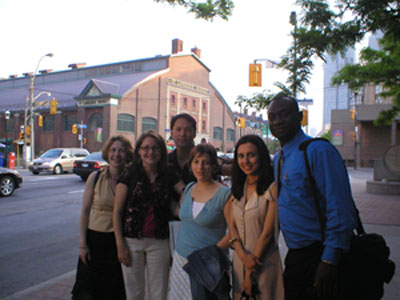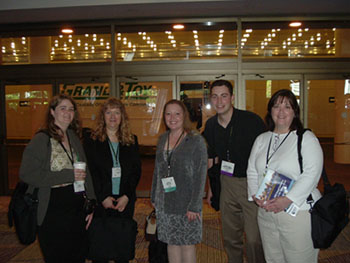
MLIS Day Students Leilani Johnson (2nd from left)
and Joanna Burgess (3rd from right), and New Friends
As the June 2005 SLA Conference recedes into the background, I hope you'll bear with me as I share some of the highlights from my conference experience. Missed connections, long layovers, mingling with 5,000 or so information professionals, darting from session to session, and competing for outdoor seating in 95 degree weather in Toronto: the SLA Conference was hard work!
Taking advantage of an Expedia package deal, Leilani and I braved a red-eye flight on the way out, and being routed through Houston on the way back. Compounding our outbound flight misadventure were tornadoes and storms in the Midwest, culminating in twelve hours of travel time, and missing our planned first conference day. But once we arrived, we made up for lost time, attending roughly a dozen sessions between the two of us within 48 hours.
Numerous and varied, the conference sessions provided a terrific array of choices. The sessions I chose to attend covered topics ranging from information repositories and knowledge management, the newest buzz about blogs, the shift toward digital content in libraries, and stories of librarians working in war zones, to the newest trends in search on the public Web. At one compelling session I attended, speakers Dennis Hamilton, Information Services Manager for architecture firm KZF Design, and Sabrina Pacifici, consultant and creator of the legal/tech news site beSpacific.com and companion blog LLRX.com, shared their experiences with blogging and discussed the advantages of establishing internal company blogs.
Intranet blogging, say what?...
Like a sort of virtual water cooler, or a replacement for that lapsed "newsletter," internal blogs work well - particularly in large companies - as a means of keeping employees abreast of what coworkers are doing, highlighting important issues or achievements, and/or facilitating communication within and across departments. Internal blogs can also act as an excellent vehicle for content management and knowledge sharing, providing easy document storage and retrieval. Some brief highlights from Pacifici's presentation:
- [Blog] Content is searchable, browsable, archived and users can comment
- Alternative to vast, impenetrable file folders of emails - valuable database is created and expanded continuously
- Inexpensive, practical KM system that does not require lots of $$$
Beyond beyond Google...
Next, just in case you thought you already knew enough about searching the free Web, sessions such as "Beyond Google," "Mining the New Web," and "Super Searcher Tips: 60 Tips in 90 Minutes" featuring current "celebrity" searchers such as Gary Price and Mary Ellen Bates, made you think again. Below (in no particular order) are just a few of the highlighted tools and resources you might want to check out if you haven't already been using them:

MLIS Evening Students Erin Roach & Deb Letterman (left),
SLA PNW President Julia Parker (center),
MLIS Evening Students Chris Erdmann & Chris Amante (right)
www.faganfinder.com
...Search engine structured by type of resource sought, including information about how different search engines function
www.missingpieces.dogpile.com,
http://ranking.thumbshots.com,
www.twingine.com
...Search engine comparison views and tracking tools
www.indeed.com...Job database metasearch engine
www.zoominfo.com...Online profiles and references ("people information") summarized and ranked
www.become.com...Targeted webcrawler focused on consumer information
www.citeseer.com...Free scientific literature digital library
http://www.melissadata.com/Lookups/index.htm...Free ready reference lookup database
http://directory.digref.org/... "ReferenceExtract" Metasearch engine that searches "Ask an expert" sites
www.clusty.com...Metasearch engine featuring customizable tabbed searching, and hierarchically clustered search results
www.feedster.com...Search engine that searches for and compiles results from RSS feeds on the open Web
www.technorati.com...Search engine for finding blogs, and searching within blogs
www.topix.net...Search engine focused exclusively on news
www.diplomacymonitor.com...Search engine focused on global political news and documents
And of course, you can peruse Gary Price or Mary Ellen Bates' recommendations directly at:
http://www.batesinfo.com/speeches.html
http://www.freepint.com/gary/2005/2005cooltools.html
Closing proposition: You are not just librarians! ...
Finally, keynote speaker Gary Hamel closed the Conference with a bang. In an invigorating and engaging speech, Hamel provided some powerful insights on the nature of change, strategic renewal, and how to stay relevant as information professionals and organizations. For me, the feeling evoked by Hamel's speech was the equivalent of being at the starting line of a race and hearing the gun fire off, "GO!" While I don't know that I can recreate this emotion, I will attempt to distill Hamel's key points:
- We are living in a time when the pace of change has gone hypercritical
- As the pace of change accelerates, so must the pace of strategic renewal
- Over the next decade, organizations will be challenged in ways that are unprecedented
- As organizations we must be resilient: this means being prepared to make automatic, spontaneous, reflexive changes, not simply becoming more efficient operationally
- Change needs to occur not only when there are crises
- Understand the ways in which people tend to deny that change must occur, going through stages of denial: "dismiss, rationalize, mitigate, confront"
- Place your emotional equity in the future rather than the past
- Challenge legacy systems, and surface dogmas
- Leverage discontinuities by seeking unexploited trends, watching people on the fringe, and looking for unvoiced needs
- Where do we look to find models of resiliency? ...Life, markets, democracy, faith, cities
- Closing proposition: You are not just librarians!
- Raise your value added: Be court jesters, Be mindset engineers, Be the future-seeking radar for your organization, Be decision architects
- Move from being custodians of information to catalysts for renewal
Exhausted but motivated, we headed back to Seattle (by way of Houston!). In addition to being provocative, informative, and fun, the Conference proved fertile grounds for networking. The best spot for meeting and greeting?: waiting in line to use the free Internet access of course! There I met and chatted with a CNN news librarian from Atlanta, a bilingual collections & rights management librarian for the Canadian National Institute for the Blind, and a reference librarian for the Ontario Library of Parliament, plus meeting and getting to know many others at the Conference in general. All in all, a terrific professional and learning experience...in Canada!
To learn about SLA 2006 in Baltimore, visit...
http://www.sla.org/content/Events/conference
